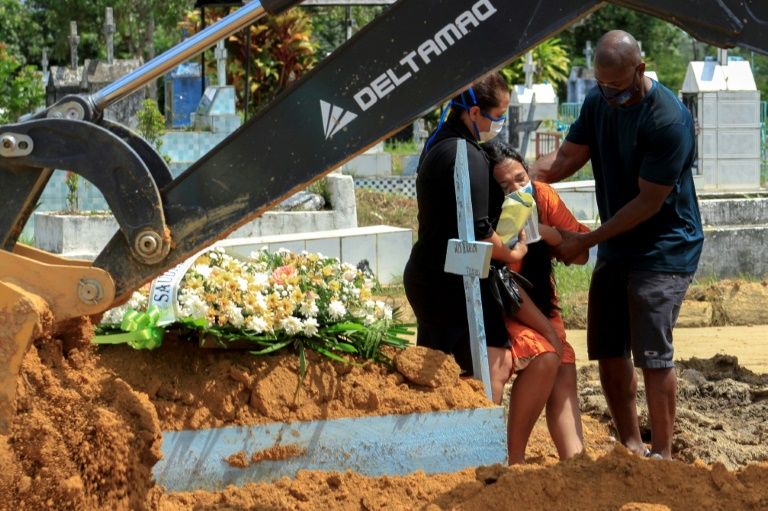Wuhan marks a year since Covid lockdown as Brazil faces protests
Brazil is one of the countries that has been worst hit by the pandemic. ©AFP MARCIO JAMES
Brasília (AFP) – Thousands of people in Brazil protested on Saturday against President Jair Bolsonaro’s handling of the coronavirus pandemic, on the anniversary of the Chinese city of Wuhan beginning its 76-day lockdown.
Governments in several countries meanwhile, scrambled to put in place new restrictions to counter surging caseloads.
Europe faced a worsening struggle with production woes hitting supply of the AstraZeneca/Oxford vaccine as well as the Pfizer/BioNTech shot.
Around the world, more than 2.1 million people have died of Covid-19 since it emerged in China in December 2019, with over 98 million infected.
In the world’s worst-hit country, US President Joe Biden warned America’s death toll could pass 600,000, the highest estimate yet that would mark a devastating rise on the 400,000 fatalities so far.
Leftist parties and organizations organised the protests in Brazil which saw some 500 vehicles paraded down the capital Brasilia’s Esplanade of Ministries blaring their horns. Painted slogans included “Bolsonaro Out,” “Impeachment Now” and “Vaccination for Everyone”.
Hundreds of cars formed similar protests in other cities, including Rio de Janeiro and Sao Paulo.
Brazilian scientists have warned that the country faces running out of vaccine doses and basic equipment like syringes, just as its vaccination campaign gets underway — and some blame the government.
In the Chinese city of Wuhan earlier Saturday, all the signs were of recovery.
Humming traffic, bustling sidewalks, and citizens packing parks and public transport underscored the scale of the recovery in the metropolis of 11 million where the pathogen first emerged before going global.
“I think Wuhan is quite safe now, safer than my hometown and most places in China,” 21-year-old resident Wang Yizhe said.
In Hong Kong however, thousands of people in Jordan, one of the city’s poorest and most densely-packed districts, were ordered to stay at home on Saturday unless they could show a negative test, in the city’s first lockdown.
– ‘Deep dissatisfaction’ –
AstraZeneca told AFP late Friday that “lower yield” at one of its vaccine-making sites would affect deliveries across Europe.
Although German and French ministers tried to reassure the public of a steady supply, other countries were less willing to accept the delays without protest.
Italy’s Prime Minister Giuseppe Conte called the delays “unacceptable” and said the government was considering legal action against AstraZeneca.
Deliveries of Pfizer-made shots to the continent’s countries are already behind schedule as the US firm upgrades capacity at a Belgian plant.
At a meeting with AstraZeneca representatives, the EU Commission “insisted on a precise delivery schedule on the basis of which member states should be planning their vaccination programmes”, Health Commissioner Stella Kyriakides tweeted.
Already cleared for use in Britain, EU authorities are expected to give the vaccine the green light at the end of January.
On Friday, British Prime Minister Boris Johnson said there was “some evidence” the new strain first detected in the country “may be associated with a higher degree of mortality” as well as being more infectious.
The World Health Organization provided reassurance that fabric masks should still work to hinder the spread of new variants from Britain, South Africa and Brazil.
However, Norwegian capital Oslo toughened health restrictions after the British variant was found in a retirement home, closing all but essential shops and asking people to restrict movements.
The Netherlands introduced its first curfew since World War II, from 9 pm to 4:30 am.
And a French government source told AFP a new lockdown in the country looked increasingly likely because of the spread of the British strain.
– ‘Surging’ –
Across the Atlantic, newly installed President Biden stepped up federal aid even as he gave his highest estimate yet of the eventual toll.
“The virus is surging,” he said. “We’re at 400,000 dead, expected to reach well over 600,000.”
And in the Colombian capital of Bogota, residents were under their third weekend of quarantine in a row, meaning the closure of all non-essential shops in the city of eight million from Friday at 8 pm until Monday at 4 am.
In Mexico, where hospitals have been overwhelmed and over 146,000 have died, people are queueing for hours to buy oxygen to care for the growing numbers fighting coronavirus at home.
In Wuhan, a team of World Health Organization experts was still in hotel quarantine ahead of a mission to investigate the source of the virus.
“All hypotheses are on the table,” WHO emergencies director Michael Ryan told a news conference in Geneva.
“And it is definitely too early to come to a conclusion of exactly where this virus started, either within or without China,” he added.
But there was good news on Friday for poorer nations, as the WHO and pharmaceuticals giant Pfizer announced a deal for up to 40 million initial doses of the Pfizer-BioNTech vaccine to be made available to them through the Covax global pool.
A separate deal, brokered by international agencies working with the WHO, will supply developing nations with tens of millions of rapid antigen tests at half the usual $5 price.
burs-tgb/jj/har
Disclaimer: Validity of the above story is for 7 Days from original date of publishing. Source: AFP.


